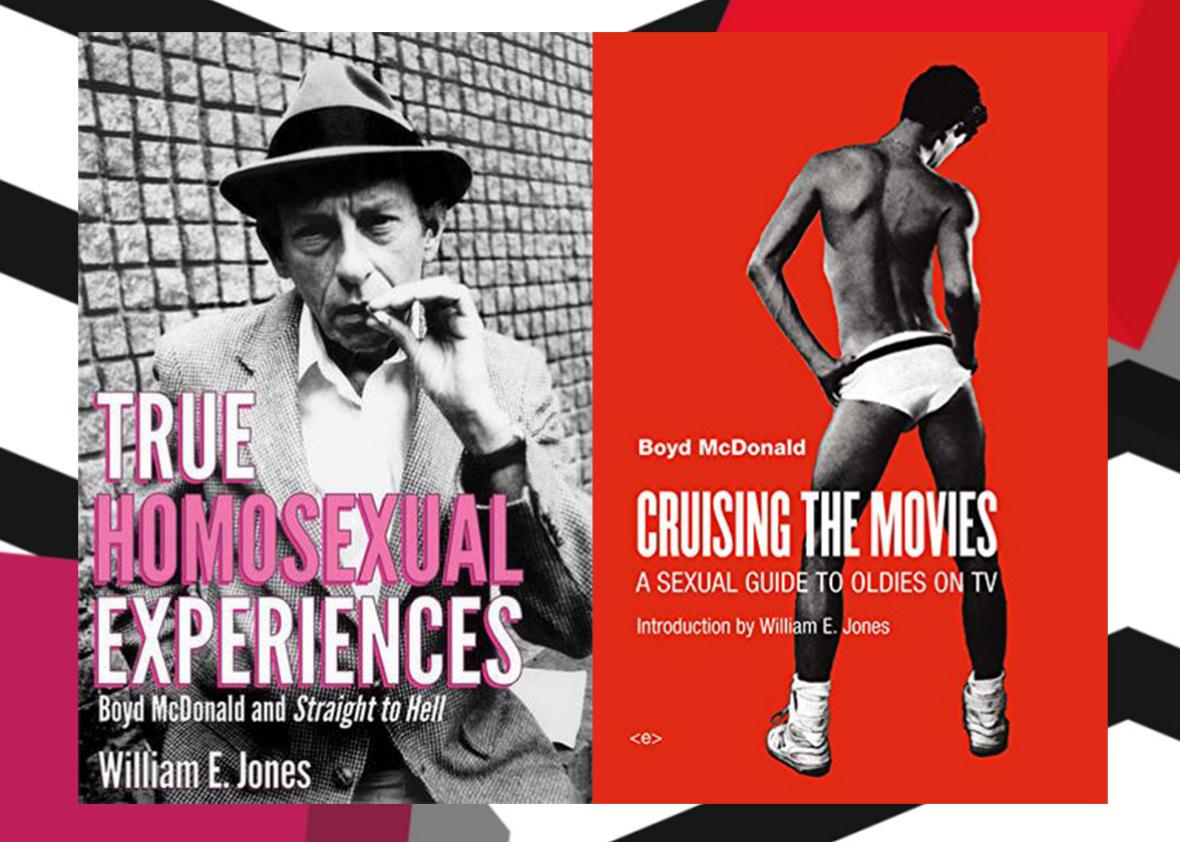“When I lived in New York there were fantastic glory hole scenes in the men’s room in the basement of the Empire Hotel at Broadway at 63rd,” begins one story in Straight to Hell, a queer zine founded in the 1970s by gay pornographer Boyd McDonald. “This is a true story about what actually happened there one rainy afternoon.”
By publishing erotic stories of illicit encounters, with outlandish titles like “Caught With a Sailor,” “Great American Toilets,” and “The Cardinal’s Chorus Boys,” in the 1970s and ’80s, McDonald established himself as the underground purveyor of stories of male-on-male encounters. Nothing was too outrageous for McDonald to print; his only rule was that the stories he solicited from his readers be true, whether their subject matter was horny cops, golden showers, or priestly intercourse.
William E. Jones, a filmmaker known for works like Tearoom (which re-presents, as art, an Ohio police squad’s secret 1962 video recordings of gay sex in public restrooms) is waging a one-man campaign to revive interest in McDonald’s life and work. Not only did he write the just-published biography True Homosexual Experiences: Boyd McDonald and Straight to Hell, he also penned the introduction to the 2015 anthology of McDonald’s gay-lensed appraisal of late-night films, Cruising the Movies: A Sexual Guide to Oldies on TV.
Thanks to the G.I. Bill, McDonald received a free ride at Harvard, before landing stints as a hack writer at Time and IBM’s corporate magazine. He drank heavily to endure the daily grind, before dropping out, signing up for welfare, renting a cheap SRO apartment on Manhattan’s West 71st Street, and starting Straight to Hell.
Gore Vidal, John Waters, and Robert Mapplethorpe were among McDonald’s readers; the last even answered a questionnaire for publication. The young photographer responded to such burning journalistic questions as “Do you have a nice ass?” “Do your underpants smell good?” and “Are you glad you have a cock?” (Mapplethorpe answered in the affirmative every time.)
But it wasn’t just tales of horniness that caught McDonald’s eye. By blending porn with political commentary, he trod a similar path to heterosexual pornographers like Hugh Hefner, Larry Flynt, and even Al Goldstein, whose publications (Playboy, Hustler, and Screw, respectively) were staunch defenders of free speech, whether that speech was pornographic or political.
McDonald mocked Henry Kissinger by printing a photo of what appears to be the statesman picking his nose amid the tales of gay sex. President Gerald Ford was similarly disparaged: “He’s worried, he said on national TV, about his waistline,” writes McDonald. “To do all that exercise and eat so little and still have a gut like that is merely disgusting; to worry about it more than he worries about equal justice is depraved.” Of Nixon crony Cardinal Terence Cooke, McDonald wrote, “What makes Cooke especially sickening, in his opposition to New York City’s proposed bill for equal rights for homosexuals, is that he takes the standard yahoo line that homosexuals are aggressors who prey upon innocent ‘straights.’ ”
Even his film reviews for Christopher Street magazine, later compiled in Cruising the Movies, blend admiration of the male form with scathing political opinion. McDonald slammed Ronald Reagan’s body along with his politics: “Ronnie Reagan’s bizarre legs are sufficient reason to watch John Loves Mary,” McDonald writes, noting that “The big fat tits Ronnie developed later supplied an additional incentive to make himself feel manly by issuing, as President of the United States, an anti-homosexual statement. What a hero.”
McDonald watched films, as Jones puts it, “against the grain,” offering up his homoerotic interpretations of conventional heterosexual romances and male buddy movies. The Celluloid Closet, Vito Russo’s bible of gay cinema, defines Claude Lévi-Strauss’ term bricolage as “playing around with the cinematic images offered us so as to bend their meaning to our own purpose.” McDonald does exactly this, focusing almost exclusively on the beauty of the actors; plot and directors really don’t interest him. In the marvelously titled “When Nick Nolte and Peter Strauss Smell Each Other,” for example, McDonald imagines what might happen if the two men, who are pictured in bed together in a scene, were playing lovers rather than brothers: “He [Nolte] might at least have pulled off his underpants under the bed covers and tossed them onto the floor,” he muses.
Unlike mainstream movie critics, who attend pre-release press screenings, McDonald tuned in to 2 a.m. TV reruns. (He always made note of the airtime in his reviews.) It’s tempting to call McDonald a blogger before the age of the Internet, a man who dissected last night’s television long before anyone else had the same idea. His brand of irreverent pornography lives on: Straight to Hell is still being published, in print and online. Politics seem to be absent from the magazine these days, but the pitch-perfect porn—“Hey, we had explosive diarrhea together in Midtown. … Wanna Hook Up?”—retains McDonald’s raunchy good humor. He also left us with a blueprint for freewheeling, unashamedly erotic free speech—and the inability to ever look at Ronald Reagan in quite the same way again.
